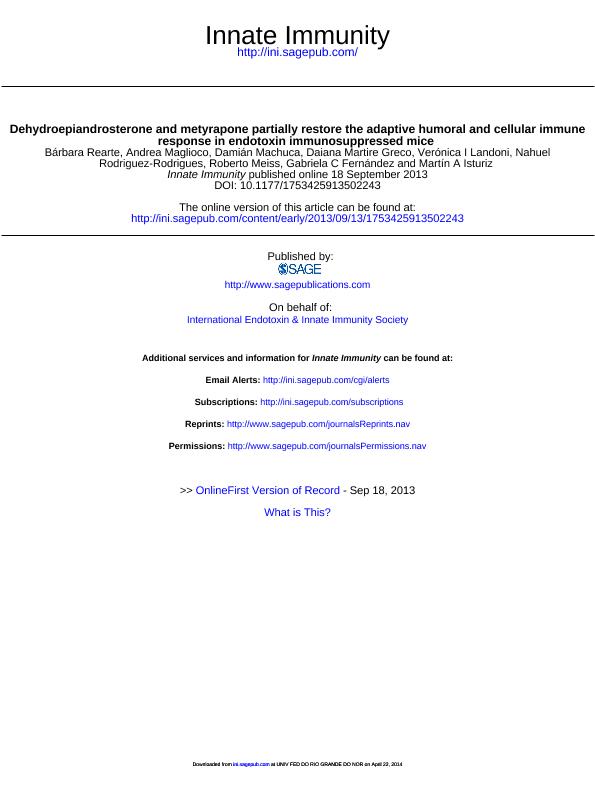Mostrar el registro sencillo del ítem
dc.contributor.author
Rearte, Barbara
dc.contributor.author
Maglioco, Andrea Florencia

dc.contributor.author
Machuca, Damián Gabriel

dc.contributor.author
Martire Greco, Daiana

dc.contributor.author
Landoni, Verónica Inés

dc.contributor.author
Rodriguez Rodrigues, Nahuel Emiliano

dc.contributor.author
Meissl, Roberto Jose

dc.contributor.author
Fernández, Gabriela Cristina

dc.contributor.author
Isturiz, Martín Amadeo

dc.date.available
2017-07-21T15:25:36Z
dc.date.issued
2013-09
dc.identifier.citation
Rearte, Barbara; Maglioco, Andrea Florencia; Machuca, Damián Gabriel; Martire Greco, Daiana; Landoni, Verónica Inés; et al.; Dehydroepiandrosterone and metyrapone partially restore the adaptive humoral and cellular immune response in endotoxin immunosuppressed mice; Sage Publications; Innate Immunity; 20; 6; 9-2013; 585-597
dc.identifier.issn
1753-4259
dc.identifier.uri
http://hdl.handle.net/11336/21063
dc.description.abstract
Prior exposure to endotoxins renders the host temporarily refractory to subsequent endotoxin challenge (endotoxin tolerance). Clinically, this state has also been pointed out as the initial cause of the non-specific humoral and cellular immunosuppression described in these patients. We recently demonstrated the restoration of immune response with mifepristone (RU486), a receptor antagonist of glucocorticoids. Here we report the treatment with other modulators of glucocorticoids, i.e. dehydroepiandrosterone (DHEA), a hormone with anti-glucocorticoid properties, or metyrapone (MET) an inhibitor of corticosterone synthesis. These drugs were able to partially, but significantly, restore the humoral immune response in immunosuppressed mice. A significant recovery of proliferative responsiveness was also observed when splenocytes were obtained from DHEA- or MET-treated immunosuppressed mice. In addition, these treatments restored the hypersensitivity response in immunosuppressed mice. Finally, although neither DHEA nor MET improved the reduced CD4 lymphocyte count in spleen from immunosuppressed mice, both treatments promoted spleen architecture reorganization, partially restoring the distinct cellular components and their localization in the spleen. The results from this study indicate that DHEA and MET could play an important role in the restoration of both adaptive humoral and cellular immune response in LPS-immunosuppressed mice, reinforcing the concept of a central involvement of endogenous glucocorticoids on this phenomenon.
dc.format
application/pdf
dc.language.iso
eng
dc.publisher
Sage Publications

dc.rights
info:eu-repo/semantics/openAccess
dc.rights.uri
https://creativecommons.org/licenses/by-nc-sa/2.5/ar/
dc.subject
Dhea
dc.subject
Glucocorticoids
dc.subject
Immunosuppression
dc.subject
Lps
dc.subject
Metyrapone
dc.subject.classification
Inmunología

dc.subject.classification
Medicina Básica

dc.subject.classification
CIENCIAS MÉDICAS Y DE LA SALUD

dc.title
Dehydroepiandrosterone and metyrapone partially restore the adaptive humoral and cellular immune response in endotoxin immunosuppressed mice
dc.type
info:eu-repo/semantics/article
dc.type
info:ar-repo/semantics/artículo
dc.type
info:eu-repo/semantics/publishedVersion
dc.date.updated
2017-07-17T21:14:34Z
dc.journal.volume
20
dc.journal.number
6
dc.journal.pagination
585-597
dc.journal.pais
Estados Unidos

dc.journal.ciudad
Thousand Oaks
dc.description.fil
Fil: Rearte, Barbara. Consejo Nacional de Investigaciones Científicas y Técnicas. Instituto de Medicina Experimental. Academia Nacional de Medicina de Buenos Aires. Instituto de Medicina Experimental; Argentina
dc.description.fil
Fil: Maglioco, Andrea Florencia. Consejo Nacional de Investigaciones Científicas y Técnicas. Instituto de Medicina Experimental. Academia Nacional de Medicina de Buenos Aires. Instituto de Medicina Experimental; Argentina
dc.description.fil
Fil: Machuca, Damián Gabriel. Consejo Nacional de Investigaciones Científicas y Técnicas. Instituto de Medicina Experimental. Academia Nacional de Medicina de Buenos Aires. Instituto de Medicina Experimental; Argentina
dc.description.fil
Fil: Martire Greco, Daiana. Consejo Nacional de Investigaciones Científicas y Técnicas. Instituto de Medicina Experimental. Academia Nacional de Medicina de Buenos Aires. Instituto de Medicina Experimental; Argentina
dc.description.fil
Fil: Landoni, Verónica Inés. Consejo Nacional de Investigaciones Científicas y Técnicas. Instituto de Medicina Experimental. Academia Nacional de Medicina de Buenos Aires. Instituto de Medicina Experimental; Argentina
dc.description.fil
Fil: Rodriguez Rodrigues, Nahuel Emiliano. Consejo Nacional de Investigaciones Científicas y Técnicas. Instituto de Medicina Experimental. Academia Nacional de Medicina de Buenos Aires. Instituto de Medicina Experimental; Argentina
dc.description.fil
Fil: Meissl, Roberto Jose. Academia Nacional de Medicina de Buenos Aires; Argentina
dc.description.fil
Fil: Fernández, Gabriela Cristina. Consejo Nacional de Investigaciones Científicas y Técnicas. Instituto de Medicina Experimental. Academia Nacional de Medicina de Buenos Aires. Instituto de Medicina Experimental; Argentina
dc.description.fil
Fil: Isturiz, Martín Amadeo. Consejo Nacional de Investigaciones Científicas y Técnicas. Instituto de Medicina Experimental. Academia Nacional de Medicina de Buenos Aires. Instituto de Medicina Experimental; Argentina
dc.journal.title
Innate Immunity

dc.relation.alternativeid
info:eu-repo/semantics/altIdentifier/url/http://journals.sagepub.com/doi/abs/10.1177/1753425913502243
dc.relation.alternativeid
info:eu-repo/semantics/altIdentifier/doi/http://dx.doi.org/10.1177/1753425913502243
Archivos asociados
